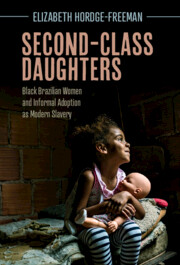'Second-Class Daughters is a beautifully written and theoretically rich book that offers an expansive and nuanced portrait of informal adoption in Brazil. In centering the experiences of filhas de criação, Hordge-Freeman reveals the blurring of the line between exploitation and intimate familial ties, while also reminding us of the disturbing ways that racial pasts are layered onto the present.'
Tianna Paschel - University of California, Berkeley
'Written with deep compassion, insight, sensitivity, and astute knowledge of the ways race, gender, and class structure Brazilian society, Elizabeth Hordge-Freeman’s new book is a must read for all those studying Brazil. It reveals how families deemed safe and sacred by many, can be the very place where devastating and life-changing discrimination and socialization into second-class citizenship can occur. By again focusing on families, Hordge-Freeman adds another major research accomplishment to her important work on race, class, and gender in Brazil.'
Bernd Reiter - Texas Tech University
'A beautifully written account of Black impoverished girls given up for ‘adoption’ to families to raise as their daughters who instead became unpaid exploited child workers laboring within a web of ambiguous family contexts of affective bonds of gratitude, passion, and love. Hordge-Freeman weaves these life stories to expose the legacy of colonial slavery embedded in the structural disadvantages of racialized and gendered systems of oppression. Second-Class Daughters never loses sight of the women’s strategies of freedom and resistance and the structural changes required to end this labor exploitation.'
Mary Romero - author of The Maid's Daughter: Living Inside and Outside the American Dream
an important and heartwrenching exposé of children saved from starvation through informal adoptions … Forcing us to not look away from current situations of trauma and abuse hidden within the domestic sphere, this book deepens our understanding of gendered and racialized violence in Brazil.'
Jennifer Roth-Gordon
Source: Social Forces
‘… an excellent contribution to researchers across fields [that] promises to be groundbreaking as notions such as ‘affective captivity’ and ‘affective architecture of domination’ can be applied to other social science studies that question power and domination beyond adoptive daughters.’
Gladys Mitchell-Walthour
Source: Sociology of Race and Ethnicity



